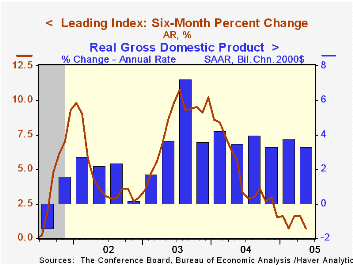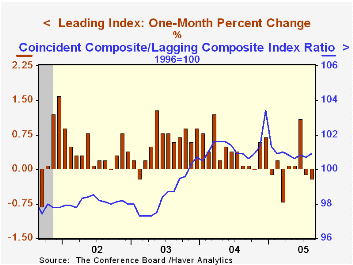 Global| Sep 22 2005
Global| Sep 22 2005Leading Economic Indicators Post Second Decline
by:Tom Moeller
|in:Economy in Brief
Summary
The August Composite Index of Leading Economic Indicators reported by the Conference Board fell 0.2% following a revised 0.1% dip in July. These declines and slight downward revisions to prior months' data lowered six-month growth in [...]

The August Composite Index of Leading Economic Indicators reported by the Conference Board fell 0.2% following a revised 0.1% dip in July. These declines and slight downward revisions to prior months' data lowered six-month growth in the leaders to 0.7%, the worst since 2001.
The breadth of one month gain amongst the 10 components of the leading index fell to 50%, down from a high of 85% during June. Lower consumer expectations had the largest negative effect on the leader's one month change.
The method of calculating the contribution to the index from the interest rate yield spread has been revised. A negative contribution will now occur only when the spread inverts rather than when declining as in the past. More details can be found here.
The leading index is based on eight previously reported economic data series. Two series, orders for consumer goods and orders for capital goods, are estimated.
The coincident indicators rose 0.2% (2.7% y/y) with each of the four components up during the last six months.
The lagging indicators fell 0.1%, the first m/m decline this year. Increases since the 2004 low have been moderate by postwar standards. The ratio of coincident to lagging indicators, a measure of actual economic performance versus excess, rose slightly m/m but has moved sideways this year.
Visit the Conference Board's site for coverage of leading indicator series from around the world.
| Business Cycle Indicators | Aug | July | 6-Month Chg | 2004 | 2003 | 2002 |
|---|---|---|---|---|---|---|
| Leading | -0.2% | -0.1% | 0.7% | 7.7% | 5.1% | 5.0% |
| Coincident | 0.2% | 0.1% | 2.4% | 2.7% | 0.4% | -0.6% |
| Lagging | -0.1% | 0.3% | 2.4% | -0.1% | -0.1% | -0.7% |
Tom Moeller
AuthorMore in Author Profile »Prior to joining Haver Analytics in 2000, Mr. Moeller worked as the Economist at Chancellor Capital Management from 1985 to 1999. There, he developed comprehensive economic forecasts and interpreted economic data for equity and fixed income portfolio managers. Also at Chancellor, Mr. Moeller worked as an equity analyst and was responsible for researching and rating companies in the economically sensitive automobile and housing industries for investment in Chancellor’s equity portfolio. Prior to joining Chancellor, Mr. Moeller was an Economist at Citibank from 1979 to 1984. He also analyzed pricing behavior in the metals industry for the Council on Wage and Price Stability in Washington, D.C. In 1999, Mr. Moeller received the award for most accurate forecast from the Forecasters' Club of New York. From 1990 to 1992 he was President of the New York Association for Business Economists. Mr. Moeller earned an M.B.A. in Finance from Fordham University, where he graduated in 1987. He holds a Bachelor of Arts in Economics from George Washington University.
More Economy in Brief
 Global| Feb 05 2026
Global| Feb 05 2026Charts of the Week: Balanced Policy, Resilient Data and AI Narratives
by:Andrew Cates






